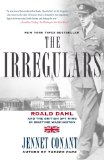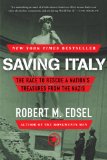Summary | Excerpt | Reviews | Beyond the book | Read-Alikes | Genres & Themes | Author Bio

Roald Dahl and the British Spy Ring in Wartime Washington
by Jennet Conant History pops right off the page in Jennet Conant's book about, of all things,
British spies operating in the United States consigned to produce, of all
things, propaganda that would shake Americans out of their isolationist lethargy
and come to the aid of Great Britain in their battle with Germany. What pops
most is the fact that one generally thinks of spies in terms of the famed James
Bond who infiltrated enemy camps to bring back or sabotage secret war
strategies. However, the US and Britain were not enemies. Nor were they allies –
yet. That is why Roald Dahl's group, overseen by the famous Anglo uber spymaster
Bill Stephenson, aka Intrepid, was charged with penetrating American circles of
power in order to bust the nation's neutrality on the issue of Hitler's threat.
History pops right off the page in Jennet Conant's book about, of all things,
British spies operating in the United States consigned to produce, of all
things, propaganda that would shake Americans out of their isolationist lethargy
and come to the aid of Great Britain in their battle with Germany. What pops
most is the fact that one generally thinks of spies in terms of the famed James
Bond who infiltrated enemy camps to bring back or sabotage secret war
strategies. However, the US and Britain were not enemies. Nor were they allies –
yet. That is why Roald Dahl's group, overseen by the famous Anglo uber spymaster
Bill Stephenson, aka Intrepid, was charged with penetrating American circles of
power in order to bust the nation's neutrality on the issue of Hitler's threat.
 It is a matter of historical record that America had to be practically
dragged, kicking and screaming, into war with Japan. It is also a matter of
historical record that the number of Americans siding with the likes of Charles
Lindbergh who believed the US ought not to get involved in any kind of conflict
on the European front outnumbered those who favored intervention -- at least in
the beginning. Lindbergh had numerous reasons for his beliefs but the British
judged that Hitler's threat to all democracies everywhere trumped any fears the
isolationists had. The British also knew they were running out of resources to
face off against Nazi military forces. Thus they embarked upon a plan to shake
up the sensibilities of Americans in high and powerful places, manipulating them
to get them involved.
It is a matter of historical record that America had to be practically
dragged, kicking and screaming, into war with Japan. It is also a matter of
historical record that the number of Americans siding with the likes of Charles
Lindbergh who believed the US ought not to get involved in any kind of conflict
on the European front outnumbered those who favored intervention -- at least in
the beginning. Lindbergh had numerous reasons for his beliefs but the British
judged that Hitler's threat to all democracies everywhere trumped any fears the
isolationists had. The British also knew they were running out of resources to
face off against Nazi military forces. Thus they embarked upon a plan to shake
up the sensibilities of Americans in high and powerful places, manipulating them
to get them involved.
 Their tactic was shear genius. Enlist the efforts of chaps such as the dashing
RAF fighter plane pilot Roald Dahl to wine and dine their way into Washington
DC's inner circle, plant specific (sympathetic to Britain) information into
hands that would, in turn, work it into newspapers and magazines, then deliver
American intelligence back to the British leadership. As Conant says, Dahl was
"a natural choice for their kind of work. He had a writer's ear for the telling
phrase and a talent for asking questions without appearing overly inquisitive.
As a pilot and author, he also had legitimate cover, which was always the best
kind…and was perfectly positioned to extend the BSC's [British Security
Coordination] network of well-placed Washington sources."
Their tactic was shear genius. Enlist the efforts of chaps such as the dashing
RAF fighter plane pilot Roald Dahl to wine and dine their way into Washington
DC's inner circle, plant specific (sympathetic to Britain) information into
hands that would, in turn, work it into newspapers and magazines, then deliver
American intelligence back to the British leadership. As Conant says, Dahl was
"a natural choice for their kind of work. He had a writer's ear for the telling
phrase and a talent for asking questions without appearing overly inquisitive.
As a pilot and author, he also had legitimate cover, which was always the best
kind…and was perfectly positioned to extend the BSC's [British Security
Coordination] network of well-placed Washington sources."
 Dahl had his marching orders – to do whatever was necessary to bring the muscle
of the mighty US military force into the European conflict. And he did, with
gusto. Rubbing shoulders with Eleanor, vacationing with Franklin, schmoozing
Winchell, Pearson and Walter Lippman, and sleeping with whoever could advance
his mission (plus a few just for fun) became his primary occupation for the
duration. He was accompanied by Ian Fleming (creator of aforementioned James
Bond), Noel Coward, David Ogilvy (of advertising fame) and several others, who
preferred to be called the Baker Street Irregulars – a nod to Sherlock Holmes'
ragtag gang of amateur sleuths – rather than BSC agents. As Stephenson used to
say, "our side has agents; the enemy has spies."
Dahl had his marching orders – to do whatever was necessary to bring the muscle
of the mighty US military force into the European conflict. And he did, with
gusto. Rubbing shoulders with Eleanor, vacationing with Franklin, schmoozing
Winchell, Pearson and Walter Lippman, and sleeping with whoever could advance
his mission (plus a few just for fun) became his primary occupation for the
duration. He was accompanied by Ian Fleming (creator of aforementioned James
Bond), Noel Coward, David Ogilvy (of advertising fame) and several others, who
preferred to be called the Baker Street Irregulars – a nod to Sherlock Holmes'
ragtag gang of amateur sleuths – rather than BSC agents. As Stephenson used to
say, "our side has agents; the enemy has spies."
Conant's spirited account brings all these characters and their wartime intrigue
to scintillating life as she drops names and exposes more extramarital affairs
among the nation's powerbrokers than today's religious right wingers could shake
a "shame-on-you stick" at.
Photos: Top: Roald Dahl when he was a RAF pilot, which likely dates the photo to 1939-1941 - after a serious crash in 1940 which fractured his skull, smashed his nose, and temporarily blinded him, he returned to active service but was invalided home in He was invalided home to Britain in June 1941 with the rank of Flight Lieutenant. 2nd: David Ogilvy, probably taken in the 1950s. 3rd: Undated photo of Ian Fleming (from ianfleming.com), Bottom: Noel Coward in 1930
Interesting to Note
It was during the wartime period that Dahl discovered a talent for writing - penning
his first book,
Gremlins, in 1943. Illustrated by Walt Disney Studios, possibly by
Disney himself, and slated to be made into a movie (which was later canceled).
Gremlins fell out of print shortly after the war, but was republished in
2006.
![]() This review was originally published in The BookBrowse Review in September 2008, and has been updated for the
October 2009 edition.
Click here to go to this issue.
This review was originally published in The BookBrowse Review in September 2008, and has been updated for the
October 2009 edition.
Click here to go to this issue.

If you liked The Irregulars, try these:

by Robert M. Edsel
Published 2014
An unforgettable story of epic thievery and political intrigue, Saving Italy is a testament to heroism on behalf of art, culture, and history.

by David John
Published 2013
A cynical English reporter and a beautiful, headstrong, American Olympic hopeful are caught in a lethal game of international espionage during the 1936 Berlin Olympics
Your guide toexceptional books
BookBrowse seeks out and recommends the best in contemporary fiction and nonfiction—books that not only engage and entertain but also deepen our understanding of ourselves and the world around us.